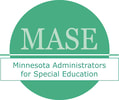Virtual MASE Legislative Updates with Valerie Dosland
To keep members informed on legislative developments, MASE lobbyist, Valerie Dosland, will be providing members with regular legislative updates during the session. These updates will cover key issues advancing of interest to MASE and provide an opportunity for you to ask questions and share concerns and information.
Thank you to everyone who joined us this year!
Documents from the May 22, 2024 Legislative Summary Webinar!

